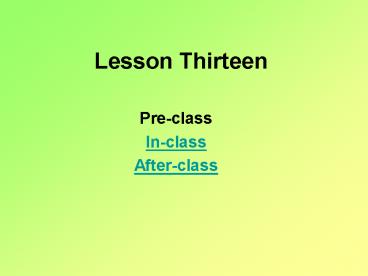Lesson Thirteen PowerPoint PPT Presentation
1 / 17
Title: Lesson Thirteen
1
Lesson Thirteen
- Pre-class
- In-class
- After-class
2
Pre-class (1)
- 1. Ask the students to look up the following
words and expressions meanwhile, they should
write down the explanation and copy at least one
example from the dictionary - avoid figure out in charge in regard to on
good terms put up take up weaken works - 2. Prepare for the texts. They should read the
texts before hand and know the general idea.
3
Pre-class (2)
- 3. Do the vocabulary exercise in advance.
- 4.Prepare for the recitation. The papers have
been handed out in advance. The contents of the
paragraphs are as follows - Its Never Too Late for Success
- Charles D. Rice
- You and your parents can stop worryingPasteur,
Edison, Darwin and lots more were far from being
genius in their teens.
4
Pre-class (3)
- History books seldom mention it, but the truth
is that many of our greatest figures were
practically beatniks when they, were teenagers.
They gave to daydreaming, indecision, hebetudes
(plain dullness), and they showed no promise of
being doctors, lawyers or Indian chiefs. (to be
continued)
5
Pre-class (4)
- So, young men and women, if you suffer from
the same symptoms, dont despair. The world was
built by men and women whose parents worried that
they would never amount to a hill of beans. You
dont hear too much about their early failure
because parents prefer to cite more inspiring
examples.
6
In-class
- Step one Text A
- Step two Text B
- Step three Vocabulary in Exercises
- Step four Check the recitation
????
7
Step one Text A Womens Liberation A Long Way
to Go (1)
- 1. Reading the article in teams.
- The students are asked to read the text
together in teams. They may discuss the problems
if any at this time. - 2. Check the team-reading.
- Ask each team to read one part of the
article together. Pay attention to their
pronunciation and intonation. - 3. Explanation to the article. (Notes)
8
Step one Womens Liberation A Long Way to Go
(2)
- Notes
- 1). In the 1960s. This can also be written in
the 1960s. Note the following expressions - in the early 1940s (in the early
forties) - in the mid-1970s (in the mid-seventies)
- in the late 1990s (in the late nineties)
- 2) examination ---- exam
- kilogram me ----- kilo
- laboratory ----- lab
- microphone ---- mike
- veterinary surgeon ----vet
- popular music ---- pop music
9
Step one Womens Liberation A Long Way to Go (3)
- 3). Because of the struggle put up by the Womens
Liberation Movement, the prejudice against women
is weakening and the idea of emancipation is
becoming stronger. - a. Put up by the Womens Liberation Movement is
a participle phrase modifying the struggle.
Other examples - The students punished by the teacher is Jack.
- The building completed last year is a
Childrens hospital
10
Step one Womens Liberation(4)
- b. prejudice n. ??????
- racial prejudice ????
- have a prejudice against in favor of
?????? - c. weaken v. cause to become weak
????????? e.g. - The illness has considerably weakened him.
- ???????????
- He is in a weakened condition. ???????????
11
Step one Womens Liberation (5)
- 4). Many more women not only are going out to
work but also have careers of their own, and
friends and interests quite separate from those
of their husbands. - a. the pronoun those is used here in place of
careers, friends and interests to avoid
repetition. e.g. - The novels of the 19th century are quite
different from those of the 20th. - Books printed in Shanghai seem to have better
binding than those printed in Beijing.
12
Step one Womens Liberation (6)
- b. separate adj. not together ?????? e.g.
- The houses are not joined theyre separate.
- They set up a separate state of their own.
- 4. Reading aloud.
- Ask the students to read the text again
together in teams.
??in-class
13
Step two Text B What about Womens Liberation?
(1)
- 1. Reading the article in teams.
- The students are asked to read the text together
in teams. They may discuss the problems if any at
this time. - 2. Explanation to the article.
- Explain the article sentence by sentence.
Meanwhile, the students are asked to explain or
translate some sentences to check their
understanding.
14
Step two What about Womens Liberation? (2)
- Notes
- 1). A woman is now expected to have some kind of
career which will continue to occupy and interest
her throughout her life. - occupy means fill time (space, mind, etc.)
??????????e.g. - These activities occupied all her time.
- The repair occupied him for five hours.
- Vt. to keep somebody busy ??? e.g.
- His work occupies him for the whole day.
- ???????????
15
Step three Vocabulary in Exercises
- About exercise 8, the students should fill in the
blanks using the given words or phrases.
Meanwhile, they are asked to translate the
sentences. - About exercise 9, the students are asked to put
in the correct form of the word in brackets. This
exercise aims to practice their understanding of
the word formation
??In-class
16
Step four Recitation
- Check the recitation. The papers have already
been handed out to the students.
??in-class
17
After-class
- 1.Review this lesson.
- 2.Do the grammar exercises in teams.
- 3.The head of each team chairs the dictation of
this lesson.
Lesson seven

